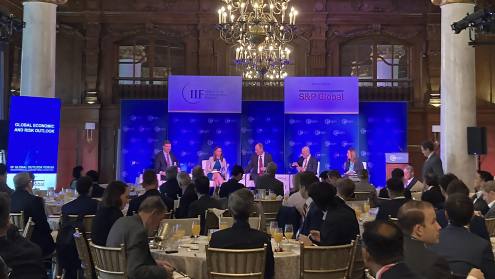History is littered with pre-emptive declarations of victory ringing hollow. The 2003 image of US president George Bush standing on the deck of the USS Abraham beneath a banner declaring “Mission Accomplished” midway through the Iraq war is one of the more infamous recent examples.
It’s a salutary reminder today that the battle to navigate the economy through the risks to price and financial stability is far from over.
For many, the March headlines of failing banks and squeezed liquidity brought memories of late-2007 and the ensuing economic havoc flooding back. Although the comparisons with today are overdone, one salient point should be remembered: back then, it took a year before the full extent of the economic damage became clear.
So while the news cycle may have moved on, the risks to the economy have not passed and will remain elevated for some time yet.
At times like these, when the economy could be close to a turning point, tracking the cycle as close to real time as possible is critical. At Oxford Economics, we have partnered with Penta Group to derive real-time measures of economic sentiment from more than 400,000 sources in 123 languages using the latest AI techniques.
This sentiment data provides valuable insights into the intentions of households and businesses, and offers a leading indicator of spending, investment and hiring decisions weeks or months before traditional economic data.
Read more about the banking turmoil
Our unique dataset shows that the banking turmoil of recent weeks has dealt a significant blow to economic confidence. In advanced economies, recession fears have risen back to levels last seen at the height of the pandemic, alongside concerns about mortgage availability, solvency and financial risks.
The response of central banks has been rapid and certainly their liquidity interventions have helped to stabilise sentiment. But they haven’t improved it. In most countries, concerns about financial markets and the availability of credit remain as high today as they were in mid-2020. It seems that suspicions over the strength of bank balance sheets die hard.
Interestingly, throughout the market turmoil, our measures of consumer confidence across advanced economies have continued to signal solid, if unspectacular, consumer spending growth.
We think a key reason for that is the ongoing strength of the labour market, which is the vital to the overall financial health and confidence of consumers. When wage growth and employment are solid, consumers remain positive.
The strength of the labour market alongside sticky core inflation is why we think the Federal Reserve and the European Central Bank will raise rates higher in the coming months. Having staked their credibility on bringing inflation back to target, central banks can’t afford to pause only to have to restart the hiking cycle if the inflation bear refuses to be tamed.
To go down that route would require a monumental communications effort to convince markets that this time they really were serious.
But the labour market is a lagging indicator of the wider economy, and it’s only now that we are seeing the impact of past rate rises on hiring, vacancies and wages. Here, there is some evidence that the labour market is starting to turn, with hiring slowing and vacancies drying up in the US and Europe.
Declaring victory too early risks allowing labour markets to reaccelerate, endangering price stability
Good news for central bankers — a cooling of the labour market is precisely what they want. But they must also be mindful that if this support for consumer sentiment is kicked away too vigorously, the economic cycle could turn quickly.
As well as confidence, another key transmission channel of bank funding turmoil to the wider economy is through the impact on lending standards. To some extent, both factors overlap: tighter credit conditions can destroy confidence as households and businesses worry about refinancing loans and end up pulling back on demand.
The problem is that changes in credit conditions are difficult to observe in a timely fashion. This brings us back to monitoring sentiment data closely for clues as to how the economy is navigating this tricky period.
So, just as the start of the global financial crisis unfolded in slow-motion, this latest bout of turmoil is likely to follow a similar path. Declaring victory too early risks allowing labour markets to reaccelerate, endangering price stability in the long run; while allowing financial risks to impact credit conditions materially will damage long-term economic growth.
Tracking developments in sentiment in as close to real time as possible will be essential to navigating the course.

Innes McFee is chief global economist at Oxford Economics, an economic advisory firm.







